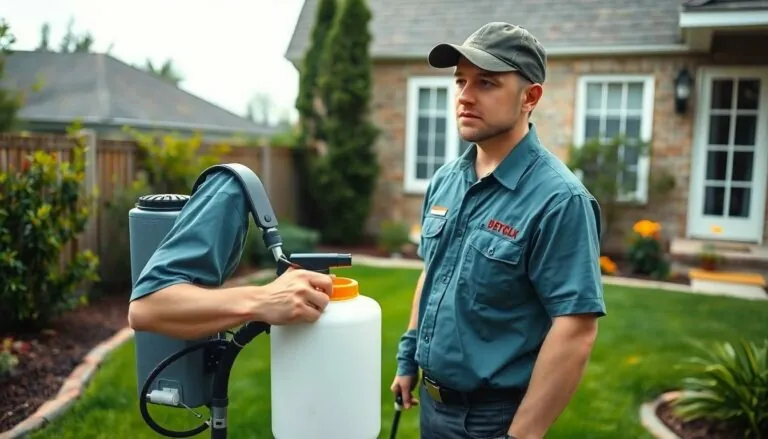Table of Contents
ToggleIn a world where pests seem to have their own social calendar, the pest control franchise is like the superhero swooping in to save the day. Imagine a business that not only rids homes of pesky intruders but also offers a chance for entrepreneurs to cash in on the action. With the right franchise, one can turn bug battles into a booming business.
Pest control isn’t just about squashing bugs; it’s about creating a pest-free paradise for families and businesses alike. As the demand for effective pest solutions grows, so does the opportunity for savvy entrepreneurs. Join the ranks of pest control pros and turn that passion for extermination into a profitable venture. After all, who wouldn’t want to make a living while keeping the critters at bay?
Overview Of Pest Control Franchise
The pest control franchise industry represents a robust growth sector in the service market. Franchises offer streamlined business models that enable entrepreneurs to benefit from established brands and operational support. Significant demand for pest control services drives potential profitability, encouraging individuals to enter this field.
Franchise owners provide essential services catering to residential and commercial clients. They tackle common pest issues, such as termites, rodents, and ants, ensuring properties remain safe and habitable. A commitment to customer satisfaction enhances brand reputation and promotes repeat business.
Initial investment varies across franchises, typically ranging from $50,000 to $150,000, depending on the brand and service offerings. Many franchises cover training, advertising, and ongoing support, easing the startup process for new owners. Access to industry resources, such as pest management education and marketing tools, aids in business growth.
Success in this industry demands adherence to regulations governing pest control practices. Compliance ensures safety for customers and technicians alike. Additionally, franchises keep pace with advancements in technology and pest management techniques, reinforcing their competitive edge.
The franchise model enables a balance between independence and support. Owners benefit from brand recognition while managing their local operations. This combination makes pest control franchises an appealing option for aspiring entrepreneurs looking to build a sustainable business.
Benefits Of Owning A Pest Control Franchise

Owning a pest control franchise offers numerous advantages that attract aspiring entrepreneurs. These benefits enhance the potential for success in this growing industry.
Proven Business Model
The pest control franchise operates on a proven business model. Franchisees leverage established practices that facilitate efficient operations. Successful brands provide a structured approach to managing services, which minimizes the learning curve for new owners. Profitability is often accelerated when entering an industry with higher demand. With a focus on operational efficiency, franchisees can enjoy a clearer path to financial success.
Brand Recognition
Brand recognition serves as a vital advantage in the pest control franchise sector. Established franchises benefit from consumer trust built over years of service. Recognition helps new franchisees attract clients more easily compared to those starting from scratch. Marketing efforts by their parent brand also enhance visibility, creating a steady flow of leads. Clients often prefer well-known brands, increasing the likelihood of repeat business and customer loyalty.
Training And Support
Robust training and support systems are hallmarks of successful pest control franchises. Most franchises provide comprehensive training programs covering essential aspects of pest management and business operations. New owners often receive guidance in areas such as marketing, administrative tasks, and customer service. Ongoing support includes access to updated resources that ensure compliance with industry regulations. These training initiatives equip franchisees to navigate challenges effectively, fostering long-term success.
Challenges Faced By Pest Control Franchises
Pest control franchises encounter various challenges that can impact their operations and growth. These hurdles require strategic planning and adaptability.
Competition In The Market
Competition in the pest control industry remains fierce. Numerous franchises operate simultaneously, each vying for market share. Differentiation becomes crucial for success. Innovative services and strong branding can attract clientele. Franchises must invest in marketing and customer relations to maintain an edge. Localized marketing efforts, such as community involvement and targeted ads, can improve visibility. Keeping prices competitive without sacrificing service quality presents another challenge. Franchises often benefit from unique selling propositions that appeal to specific demographics. Understanding local market dynamics influences the ability to stand out amidst competitors.
Regulatory Compliance
Regulatory compliance poses significant challenges for pest control franchises. Franchises must navigate federal and state regulations regarding environmental safety and pesticide usage. Adherence to guidelines is essential for legal operation. Training employees on compliance issues affects overall safety and efficiency. Regulations can vary by location, requiring franchises to stay informed about local laws. Regular audits and inspections may complicate operations, necessitating diligent record-keeping. Failure to comply can lead to hefty fines or loss of licenses. Proactively addressing compliance ensures franchises maintain their reputations and protect their investments. Keeping abreast of regulatory changes also supports long-term sustainability in the industry.
Popular Pest Control Franchise Options
Numerous options exist in the pest control franchise industry, offering aspiring entrepreneurs diverse opportunities. National chains and regional brands stand out in this growing market.
National Chains
National chains dominate the pest control landscape with well-established names. Franchisees benefit from brand recognition and extensive marketing resources. Companies like Terminix and Orkin lead the industry, providing comprehensive training and support to their franchise owners. Franchisees gain access to proven operational strategies that enhance efficiency. Many national chains also offer innovative technology solutions that improve service delivery. By leveraging a broad network, franchisees can tap into a larger customer base, which boosts revenue potential significantly.
Regional Brands
Regional brands offer unique advantages to franchise owners targeting local markets. These companies, such as Pest Control Experts or Mosquito Joe, often understand specific regional pest challenges better than larger competitors. Franchisees typically receives tailored marketing strategies that resonate with the community. Support and training from regional brands focus on localized pest control strategies, ensuring franchisees are equipped to address area-specific issues. Additionally, these companies encourage community involvement, helping build strong customer relationships. Fundraising initiatives or partnership opportunities with local businesses can enhance visibility, fostering brand loyalty among clients.
Financial Considerations
Understanding the financial aspects of a pest control franchise is essential for prospective franchisees. Key elements include initial startup costs and ongoing fees that can significantly impact profitability.
Startup Costs
Startup costs for a pest control franchise typically range from $50,000 to $150,000. This investment often covers equipment, initial inventory, and necessary licenses. Training programs also form part of the initial expenses, equipping owners with essential skills. Marketing materials and branding are additional costs that franchisees should anticipate. Securing adequate funding is crucial for ensuring smooth operations during the early stages, helping franchisees focus on growing their business.
Ongoing Fees
Ongoing fees play a significant role in the financial planning of a pest control franchise. Franchisees usually pay royalty fees, which average around 5% to 10% of their monthly gross revenue. Marketing contributions may also be required, supporting brand visibility and customer acquisition. Additional costs may include licensing renewals and insurance premiums. Staying on top of these ongoing expenses is vital for maintaining profitability and ensuring compliance with industry regulations.
The pest control franchise industry offers a unique opportunity for aspiring entrepreneurs to make a significant impact while building a profitable business. With increasing demand for pest management services and the support of established brands, franchise owners can navigate the challenges of the market more effectively.
Investing in a pest control franchise not only provides access to a proven business model but also equips owners with essential training and resources. By prioritizing customer satisfaction and staying compliant with regulations, franchisees can foster loyalty and ensure long-term success.
As the industry continues to grow, those who embrace this venture stand to benefit both personally and financially, making it a compelling choice for anyone looking to enter the entrepreneurial landscape.




